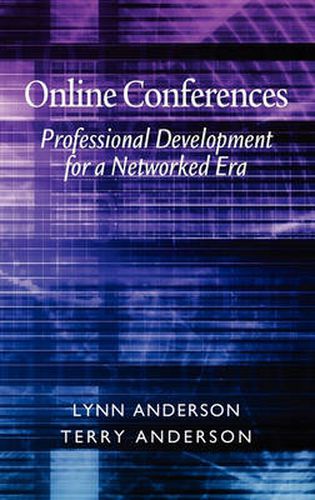Readings Newsletter
Become a Readings Member to make your shopping experience even easier.
Sign in or sign up for free!
You’re not far away from qualifying for FREE standard shipping within Australia
You’ve qualified for FREE standard shipping within Australia
The cart is loading…






This title is printed to order. This book may have been self-published. If so, we cannot guarantee the quality of the content. In the main most books will have gone through the editing process however some may not. We therefore suggest that you be aware of this before ordering this book. If in doubt check either the author or publisher’s details as we are unable to accept any returns unless they are faulty. Please contact us if you have any questions.
The professional conference has been, for many years, the primary tool for continuing education and networking in many professions. Now, however, the economic and environmental costs associated with travel, and the opportunity costs associated with absence from the workplace, compel organizers, trainers and executives to weigh the costs versus the benefits of this form of professional development. Online conferences offer an effective alternative that is economical, environmentally friendly and convenient. These factors position online professional conferences as poised to emerge as a mainstream form of lifelong learning in all professions. This book looks at the elements of effective continuing professional education, the affordances of interactive technologies, and the lessons learned by experienced online conference organizers. It is designed to provide guidance and advice to those wishing to coordinate, sponsor or participate effectively in an online professional development conference. The text describes various ways in which a variety of networking technologies are being used to support successful online professional development events. Resources for conference organizers are given in the form of links to commercial and open source software, and companies providing platforms and comprehensive support for the organization of online conferences. The text contains the results of interviews with 12 organizers of the most successful online conferences to date. Finally, a list of best practices, based on the research literature, experiences of the authors and experienced online conference organizers, is presented in the final chapter.
$9.00 standard shipping within Australia
FREE standard shipping within Australia for orders over $100.00
Express & International shipping calculated at checkout
This title is printed to order. This book may have been self-published. If so, we cannot guarantee the quality of the content. In the main most books will have gone through the editing process however some may not. We therefore suggest that you be aware of this before ordering this book. If in doubt check either the author or publisher’s details as we are unable to accept any returns unless they are faulty. Please contact us if you have any questions.
The professional conference has been, for many years, the primary tool for continuing education and networking in many professions. Now, however, the economic and environmental costs associated with travel, and the opportunity costs associated with absence from the workplace, compel organizers, trainers and executives to weigh the costs versus the benefits of this form of professional development. Online conferences offer an effective alternative that is economical, environmentally friendly and convenient. These factors position online professional conferences as poised to emerge as a mainstream form of lifelong learning in all professions. This book looks at the elements of effective continuing professional education, the affordances of interactive technologies, and the lessons learned by experienced online conference organizers. It is designed to provide guidance and advice to those wishing to coordinate, sponsor or participate effectively in an online professional development conference. The text describes various ways in which a variety of networking technologies are being used to support successful online professional development events. Resources for conference organizers are given in the form of links to commercial and open source software, and companies providing platforms and comprehensive support for the organization of online conferences. The text contains the results of interviews with 12 organizers of the most successful online conferences to date. Finally, a list of best practices, based on the research literature, experiences of the authors and experienced online conference organizers, is presented in the final chapter.